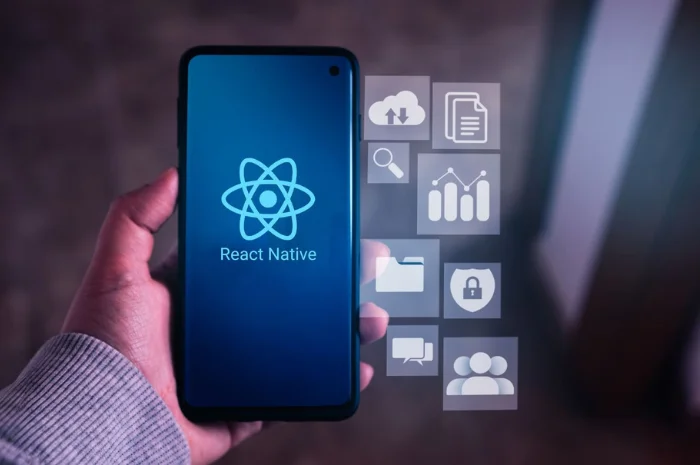Are you looking for a fast and user-friendly mobile app development platform to launch your mobile app? In this post, we will show you how React Native app development company has helped thousands of businesses develop a full-featured premium mobile app in different niches. React Native is indeed your ideal framework for cross-platform app development projects. Let’s learn more about React Native application development and the ways it can help you launch the perfect mobile app for your customers.
According to Statista, the mobile app industry is expected to generate $693 billion in 2021. This gives businesses and individuals a great opportunity to market their brand to a wider audience based in different corners of the world through a seamless and premium mobile app. There are many ways to generate earnings through a mobile app – in-app advertising and app stores are the most popular options.
A feature-packed mobile app has to be functional, easy to use, and user-friendly. These are a few crucial features that make an impressive application. The platform you choose for developing a mobile app is as important as the features that go into the application.
React Native has undoubtedly become one of the leading Android and iOS application development platforms for startups, SMEs, large-scale companies, and all types of business. Let’s understand how React Native works:
What is React Native?
An open-source mobile app development framework, React Native has become the developer’s go-to platform for all kinds of app development projects, whether it is a gaming app or a grocery store. In general, developers need to use Swift or Obj-C for developing an app for iOS devices and Java for Android. Not only does it make the process quite lengthy, but two coding languages require separate teams of developers. React Native eliminates the requirement for different languages. It allows users to re-use the same code for both platforms and create functional apps with only one coding language.
React Native isn’t new to the industry. In fact, it has been around for many years. Developed by Facebook, this open-source app development framework is users’ favorite for mobile apps. Facebook had launched ReactJS initially for its mobile app. Later, the company released the framework for web app development. However, they were still not satisfied with the platform, as it involved two coding languages. That’s when they made changes to the ReactJS and came up with React Native.
So, Why Should You Choose React Native for App Development Over Other Frameworks?
The fact that it allows you to have the same code for both Android and iOS devices is enough to show how React Native outperforms its rivals. Fortunately, that isn’t the only reason why developers choose this cross-platform framework. React Native was not available for commercial uses for a long time after it was launched by Facebook. The framework was not strong enough to help companies develop native-like apps for iOS and Androids.
Soon after Facebook made React Native available for commercial applications, it started gaining immense popularity. Today, the framework enjoys a large market share and great community support. It has gotten pretty easier for app developers to type codes for different devices and make changes to the existing apps. If you are still not convinced about the popularity and benefits of React Native, check out the below-mentioned reasons why you must consider using this open-source framework for your next app development project.
Read the blog- How do You Benefit When You Outsource React Native App Development Overseas?
1.Tested and Proven
Facebook designed React Native to build a seamless mobile app that could offer a first-class experience to the community. If you are a Facebook user, you must have tried the Facebook app on your smartphone. How does it look? Does it offer the native-app-like experience? How are the features arranged?
Facebook app is enough to prove the capabilities of React Native. Other than that, Instagram, Skype, Tesla, Discord, Bloomberg, and Walmart are the best examples of React Native mobile apps.
2.Re-use the Same Code
As we have discussed before, the USP of React Native is that it supports one codebase for iOS and Android devices, saving you the time of typing code for both devices separately. It doesn’t only work on both devices, but React Native guarantees the native-app experience. Think about it – you don’t need to hire two teams for Swift and Java coding and neither do you have to spend your time on managing separate codes. It allows you to get your mobile app up and running in no time. The single codebase means you can get a consistent experience on all platforms. All you need to look for is a mobile app development company that’s familiar with the native libraries and APIs.
Note: Mostly, there is no need for you to learn any native language, but you may have to work with native development to deploy certain functionalities that offer a native-app-like experience. This is usually required when you are supposed to work with the functions that are not available in the React Native libraries.
Read the blog- What added value can a Mobile App Development Company bring to a product owner?
3.Easy to Update Apps
A mobile app is a comprehensive solution that might take several months before it is ready to be launched. While React Native speeds up the process with its native libraries and built-in components, it doesn’t prevent typos and common errors. There is a chance you might miss out on certain errors during the testing process, and you may want to change the app once it is released on Google PlayStore or AppStore. Releasing updates is quite a challenging process when you are using the native version of the app.
You are going to have to repeat the procedure to upload the updated version of the mobile app with new features. This will be followed by the approval process that may take a short while. Google PlayStore and AppStore will go over the updated app to ensure that all functions are working seamlessly. In addition to that, users will be required to update the application manually from the play store to enjoy new features. React Native offers the Code Push functionality that makes it possible for the developers to introduce a new set of features to the app, remove errors, and make other changes during run time. Your audience will not have to re-install the app, as they will be able to notice the changes in the app in real-time.
4.Easy to Build a Mobile App
React Native supports JavaScript, which is quite a basic language for programmers. There is a good chance someone from your internal team might be familiar with JavaScript. You don’t need any other skills to build an effective and seamless mobile app using React Native. Even if you don’t have a technical team, JS developers are easier to find.
You could train your front-end app development group to learn the basics of JavaScript and build a mobile app from scratch. The best part about JavaScript is that it is one of the easiest languages to learn. You can join online JavaScript courses to learn the basics of JS and start developing apps.
5.Fastest-Growing Framework
As mentioned earlier, React Native is one of the fastest-growing frameworks. Facebook keeps launching new features to make React Native a better platform for app developers. Backed by a massive community, React Native has a plethora of options and a great library that makes it convenient for people to design a high-quality mobile app with minimal effort. The platform is growing so rapidly that even Microsoft has now considered using this open-source framework to develop a unique fork, which makes it possible for developers to design high-quality apps for Windows 10 and Xbox One.
Facebook supports React Native in multiple ways. It keeps adding new features to the framework to help solve your problems easily. The cross-platform app development functionality coupled with easy-to-use components makes React Native one of the popular frameworks for app developers. It’s also the reason why React Native is adopted by a large community of mobile app development companies across the world. The specialty of the framework is that even general developers can build an app from scratch without any technical expertise. You don’t necessarily have to be an experienced and professional app developer to build a mobile app on React Native, however, it makes sense to hire an iPhone app developer for the best results.
6.Native-app Experience
The same code is used for both iOS and Android devices with React Native, which is one of the reasons why you can never expect a 100% native app from this framework. The app might not be equivalent to a native app, but you can rest easy knowing that it delivers near-native performance. That’s because the native apps are written in either Java or Swift. For instance, Gmail offers a wonderful user experience. It connects your emails to the device and syncs the data depending on whether you are using a mobile network or Wi-Fi.
React Native might not integrate your system with the apps so closely, but it gives you an opportunity to create a native-like app that runs seamlessly on all devices. The point is it doesn’t have to be similar to the native app, but with little effort and skills, you can develop an app that looks like a native app. This can be done by writing Java or Swift code for certain functionalities.
7.Saves Time and Money
As mentioned above, the biggest advantage of choosing React Native over other frameworks is that it allows you to re-use the same code for different platforms. In fact, you can use 95% of the code for iOS and Android, thus saving time and money. Another thing that speeds up the app development process is the pre-built libraries and other ready-made components that allow users to streamline the app designing and development process. Now, you can save time and cost on building these tools from scratch. Explore the React Native library and use the pre-built components to make the process easier and faster.
It is a cost-effective option for startups that do not have the budget for hiring separate Android and iPhone app development company. You no longer need to spend your resources and money on separate developers.
8.Develop Excellent Mobile Apps
The main goal of the user is to generate mobile apps that look flawless and offer a great user experience. After all, you want the app to attract the attention of your target audience and promote your brand to a large number of people. React Native helps you achieve that by designing a premium mobile app that reduces the load time and works seamlessly on all devices. You can expect a smooth, user-friendly, and responsive interface. Not only does React Native allow you to build an app quickly, but it does that without compromising on the functionality of the application.
9.Best Support Team
React Native uses JavaScript, which can be learned easily. Even your front-end development team can learn the basics of this programming language and develop a mobile app using Java. Besides that, if you ever need support, you can rest easy knowing that React Native has a large community. Being chosen by reputable brands and established platforms, React Native has gained a lot of popularity among the iPhone and Android app development companies. So, you can easily reach out to the support team should you ever experience any technical issue or error while developing the app.
10.No Development Complexities
Another advantage of the React Native platform is that it features easy to read code. The framework features the UI library that enables users to develop simple codes that are easy to read and interpret. React Native streamlines the mobile app development project by reducing the complexities and making the overall process a whole lot smoother and faster.
The best functionality of the app is the “Hot Reload” feature that gives you a live overview of the code and its effects on the app. This helps you ensure that the app development companies generate bug-free apps without any hassle. The hot reload function is especially used to allow users to customize or change the code while uploading the mobile application.
11.A Massive Library and Built-in Tools
Earlier we mentioned the native library and built-in components available in the React Native framework. Well, this massive library and built-in tools make it easier for developers to generate bug-free code in the fastest and easiest possible way. For instance, Expo is one of the most popular React Native built-in tools that help you track the progress of your mobile app development project and test new functionalities. Similarly, you can easily check the typos in the language with the help of Flow and PropType.
12.Users get Personalized UX
The success of a mobile app depends largely on the user experience. React Native has the capabilities to separate the Native Code, Java Code, and Framework Code. This makes it possible for the app development company to develop different styles of apps. In other words, you can offer a personalized experience to every individual using your app.
You don’t get this option on Native apps. React Native, on the other hand, provide you with a high level of customization options. In fact, it enables you to set the personalized style for each user, allowing your audience to have the best experience with the app.
13.Third-party Plugins
In addition to its own library, React Native supports third-party plugins. The framework has many reusable libraries that can make the app development process smoother and easier for you. Building a mobile app from scratch requires a lot more than basic app development knowledge. Besides, it is a time-consuming procedure.
That’s why you have to use readymade third-party plugins and tools to streamline the task. All you got to do is visit the React Native community, look for necessary tools, and utilize them to improve the performance of your application. That’s how simple it is to use third-party plugins on the framework.
14.Easy Debugging Process
One of the main reasons why developers are switching to the React Native framework is that the single codebase allows an easy bug detection feature. For every bug you spot or every time you need to make changes to the app, all you have to do is update the codebase once and the results will be visible on both platforms. Ask any mobile app development company and they’ll tell you how difficult and time-consuming debugging is. It takes hours to go over the code and spot the error. React Native speeds up the process by allowing you to update the app and remove the bugs from all operating systems at once.
The mobile app is a fast-growing industry with millions of users downloading different mobile apps for a smooth and seamless shopping experience. The question is “why would they download a new mobile app”? What special features do you have to offer to your customers? In other words, how do you plan to grow your customer base through a mobile app? React Native is your ideal framework for an efficient, premium, and cost-effective mobile app.







